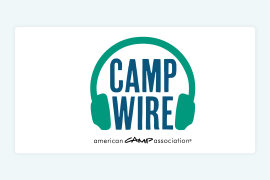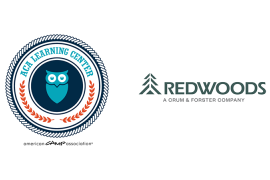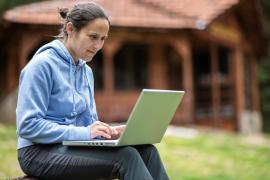You have hired your staff, but training does not begin for another few months. For our camp staff to be prepared to work with children on Day 1, their training must begin well before the buses pull into the campsite. Your training will undoubtedly consist of team-building exercises, discussion on all the policies and procedures, creating schedules, and, most importantly, prioritizing the campers. You will instill “campers first” in the staff mentality. Camps have focused on these topics in their staff training for decades.
But in today’s culture, these pieces of training are not enough. Our counselors come to camp with baggage before you are ever able to train them. According to the CDC, within the demographics of our camp counselors, 15- to 24-years-olds, suicide is the second leading cause of death. Also, 28 percent of students in grades six through 12 experience bullying (National Center for Education Statistics and Bureau of Justice Statistics) and 20 percent of students in grades nine through 12 experience bullying (stopbullying.gov). Stress and burnout are now categorized as mental illnesses and can lead to greater health issues like heart disease, type 2 diabetes, and other chronic illnesses.
These statistics are staggering.
Self-care starts with you as the camp director. It’s never too early to start training your staff on putting themselves and their needs first (so that they come to camp ready to attend to the needs of others). This includes learning to take care of their emotional and spiritual health alongside their physical health. Like a three-legged stool, these areas of health need to be in balance. Learning how to be in balance will not only serve staff during the camp season, but are lifelong skills.
Studies have shown that employees that practice self-care as part of the daily routine, are happier, more productive, less stressed and experience burnout at much lower levels than their counterparts. In turn, the morale at companies is much higher, there is greater cooperation amongst their teams, and there are lower turnover rates. All these factors combined lead to companies running more efficiently and effectively and having increased profitability.
So, what is self-care?
Physical self-care is how you take care of your body:
- Proper nutrition: This is what we feed our bodies. This includes what you eat and how you hydrate in addition to maintaining a healthy diet (and not necessarily dieting). The caution here is not to get caught up with body image. There is so much emphasis on that perfect body image put out through the advertising media and on social media that society loses track of healthy eating habits. Healthy eating includes fruits and vegetables, lean proteins, good fats (e.g., olive oil, nuts, and avocados), and whole-grain, fiber-rich carbohydrates. Hydration comes in the form of the foods eaten and water consumed.
- Body movement and exercise: This refers to daily exercise in any form, like walking, jogging, cardio machines, or any exercise video. Movement keeps the blood and oxygen flowing. Make it a habit to get up and move or change positions at least every half hour.
- Sleep and rest: Getting six to eight hours of sleep per night or taking a power nap is most beneficial. The quality of sleep or rest is as important as the number of hours.
Emotional self-care is how we are feeling. There are four main emotions — sad, glad, mad and scared. An array of emotions fits into one of these four categories. Ignoring our emotions leads to stress, mental illness (i.e. anxiety and depression), and burnout. Give yourself a break and have some self-compassion.
- Just breathe: Breathing helps us to relax, especially when feeling stressed, anxious, afraid, or emotionally drained.
- Cultivate gratitude: Take note of the small, joyous things that happen every day. Begin by creating a gratitude journal and write in it every morning or night.
- Compliment yourself: Look in the mirror at any opportunity and tell yourself what you love about yourself. This will go a long way in working toward a positive self-image.
- Learn to meditate: Being still and quiet allows you to become in tune with your intentions. Meditation can be as easy as five minutes of quiet time or for longer periods using a free app like Calm or Headspace.
- Create boundaries and learn to say “no”: Are you able to recognize when others’ emotions become yours, or when others are attempting to make you “feel” the way they do and the way they want you to feel? Only you get to decide how big this space needs to be for you to feel comfortable.
- Create a personal “toolbox”: Keep track of coping skills used in different situations.
- Create a healthy support system: These are the people who nurture and encourage you and who you can turn to for guidance. These are also the people who have no private agenda or ulterior motive. Over time, you will learn to separate those who assist you in life and those who overwhelm you, bring you down, make you anxious, or pull you down a path that deters you from being content and happy.
Spiritual self-care goes deeper than what is seen in the mirror: It is turning your attention inward to your soul or inner voice. It may be found in the beliefs of your religion or may just lay in the beauty of nature, or a higher power or belief in the universe around us. Just know that it may mean different things to different people.
- Be in nature: Wake up and smell the roses! Take advantage of being in nature and the opportunity to smell the earth, hear sounds of birds or the trees swaying in the wind, or waves crashing on the shore, and feel the sun on your face. Take time to enjoy the nature around you and experience something greater than yourself.
- Practice forgiveness: Life is too short to hold onto grievances or grudges. Who can you forgive today?
- Prayer or thankfulness journal: If prayer resonates with you, then great! If it does not, consider creating a journal where you can just be thankful for all the gifts that have been afforded you. It is easy to take our ability to see, hear, taste, walk and our health for granted.
- Read inspiring material: Why not start your day off with some positive prose or end your day being uplifted instead of focusing on lost opportunities or mistakes made?
These tips are just the tip of the iceberg. It is never too soon to implement your regiment of self-care for yourself and begin training your staff. Connect with your staff in the months and weeks leading up to camp and begin the education process through email tips and tricks or Zoom calls.
Reminder: Self-care is about balance, not perfection!
Marsha Gleit is a professional life coach, speaker, and entrepreneur. She is the founder and CEO of OMG Coaching Group. After 30 years working in C-level positions in Corporate America, she found her passion for helping others grow in their personal and professional lives. Marsha couples her business knowledge with her life coaching toolbox to help her camp clients integrate self-care into their camping programs. Practicing daily self-care changed her in ways that she could not have imagined. Self-care is the cornerstone of her practice and she believes you must put your oxygen mask on first, so you can serve others with your best self and be your best.
This blog post is in support of Project Real Job.




